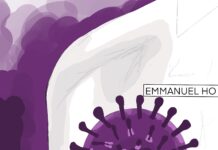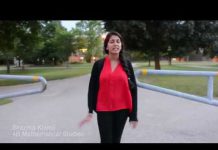J. Y. Zhang is the first place winner of the short story contest hosted by the Waterloo Science Fiction & Fantasy Club (WATSCIF) out of 14 qualifying entries. They got the idea for the article after a friend sent along an article about lacewing butterflies.
Jie, are you listening?
Would you like to hear a story?
It begins like this: long ago, a population of arthropods had a scarcity of resources.
Scarcity favors a departure from the former-self. Populations with many distinct forms exploit distinct sources of nutrition — they will survive over generations in a single form, sharing a single source.
This is why metamorphosis emerged in insects, 320 million years ago.
#
Do you remember the first day Ma brought us to the lab with her after school? She was convinced it would be a good supplement to our history unit on ecological collapse.
The two of us watched an opalescent pair of wings twitch on a synthetic blade of grass beneath the blue light. Ma kept the lacewing in a box of borosilicate glass. The air machine droned as it pumped — you had to take off your glasses because they kept fogging up in the heat.
It was the first time we saw a living animal from Terra. The two of us pressed our noses to the glass, sharing a look of awe.
“Isn’t she beautiful?” Ma crooned as she threaded her cool fingers through our scalps.
It was one of the rare times I loved her.
#
In Lepidoptera, metamorphosis is spurred on by hormonal changes in adolescence. Typically, after the fifth molt, but not always, programmed cell death readies larvae tissue for maturing. In the pupa, this tissue is digested to grow the adult body.
The genome of Lepidoptera has not changed in 250 million years. In other words, this is how it has always happened. This is how it will continue to happen.
#
Do you remember, Jie? When I got my period, Ma took me to the only herbalist on the station three modules away, only for the wrinkled woman to prescribe me a pouch of brown sugar the color of ash. When you got your period a month later in the middle of the night — the barest pink in the toilet paper you held for me to see — Ma rushed you down to the laboratory and I cried out in unfairness, but the node had emptied and there was no one to hear me.
Later, you told me how strange of a night it was: Ma distanced by her pair of loupes as she made you undress. You, dripping all over those white tiles while she watched you for hours and did nothing. Your feet, slimy and numb, knees quivering. You didn’t try to move at all, knowing Ma and obeying her; unlike me, knowing Ma and defying her.
She made herself a coffee as Tau Ceti’s blue gleam blotted the sky. You didn’t tell me if your stomach had hurt back then, but I remember the way I once described this pain to you — like a bug was trying to crawl out.
After you showered, after Ma took you into her arms, after she folded your laundered clothes and ushered you to the veiled infirmary to dress, you came home alone with a tanghulu.
“Don’t make that face,” you said. “Look what Ma got us. Aren’t you tired of the rations, Shiyang?”
It was for you alone. I knew this — knew you were lying, but I sunk my teeth greedily into the sour hawthorn, refusing to speak to you.
#
I keep asking myself why we grew apart as we grew older. I keep asking myself, even as I know.
#
Entomologists once proved with neuroimaging that the associative memories of caterpillars persists through metamorphosis. Despite the traumas of the chrysalis, butterflies know to avoid odors it once learned to avoid as caterpillars.
We do not know if Lepidoptera have episodic memories, or if it, too, would endure.
Ma has always believed that it would.
#
What I keep going back to, Jie, is the night we broke into Ma’s study while she was gone and found the old discs. She was always so fond of vintages. She kept the metal slate on the wall and it took no time for us to figure out where to slot things. The flat screen buzzed, then glowed.
An accented voice spoke over a video of Terra. Sol blushed past a forest, the strange atmosphere clean blue and teeming with condensation. The lens focused on a lone figure in a field of tall grass — an antelope with glossy hide and strong coils of horn.
“Is it only me,” I said, biting my lips, “Or does it look like Ma?”
We laughed, tried to quiet ourselves, then laughed harder. After the film ended, we lay on our backs as we felt the woven thread of her Persian carpet that we were never supposed to touch. You turned to me, and your eyes were serious. “Sometimes you’re too hard on her, you know?”
“You’re kidding.”
“I mean it.” You looked up to the low ceiling where there was nothing, stretching your hand out to nothing. “It’s people like her who’ll fix this place up.”
I’ve always hated that look in your eyes — as though you already knew where you would go. I thought of taking your hand to bring it down but stopped myself. “Is that what you want to do with your life? What Ma does?”
You considered this deeply. “Of course.” I remember the bark of my laugh, that terrible noise, like the cleave of metal. “That’s never going to happen. You know that, right? You can’t possibly think that you’re—”
I’m sorry. I won’t repeat it to you. You understand, don’t you? That when you love someone too much, it spills in these terrible, ugly ways.
#
Like many things, biology is only a marvel in retrospect. Many pre-extinction animals underwent metamorphosis as they matured — insects, fish, amphibians. Yet there were no known mammals that experienced this process.
That is, until Ma had an idea.
#
“Shiyue,” Ma said to you one morning as she collected your half-empty bowl of slop, “Have you been eating enough?”
You looked away, pinning threads of fine, black hair behind your ears. You were growing taller, and I wasn’t growing at all. Our once homogeneous distribution of body fat sat elegantly on your lengthening femur and tibia. Your full moon cheeks had thinned, and the boys at school were asking me about you.
“I think she’s making herself throw up,” I said, though it wasn’t true.
“I’m asking your sister,” Ma said. The bowl hit the sink louder than usual.
I wanted you to bite back, but you were never willing to hurt me in the ways I hurt you. I wanted you to look me in the eye with scorn for once, instead of looking away — to make what I did to you fair.
You sighed. “Don’t listen to Meimei. My appetite’s been off lately. It makes me nauseous when I eat too much, that’s all.”
Then Ma was running out of the kitchen, soap suds dripping from her fingertips and sinking into the carpet. The water was still running. When she looked at you, it was like I wasn’t in the room at all, like the oxygen I took with each breath was a waste.
“Shiyue, I’m taking you to the lab,” Ma said, and I waited for the two of you to disappear, used to abandonment by then.
I wish so desperately that I had said something to you — anything at all.
#
If there’s anything that matters in all the kludge I’m telling you, it’s this:
Long ago, a scarcity of resources forced a larva to digest itself to grow up. 350 million years later, and 12 lightyears displaced on the Tau Ceti Station Entomology Lab, Dr. Han impregnates herself with two embryos — both fertilized by the same sperm donor, and yet irreconcilably different by genome.
She will name one after the sun, and another after the moon. She will find one to be more beautiful.
#
When I saw you half a year later, Ma promised me you would wake up soon.
“Don’t be upset, Shiyang,” she said.
I could not speak to her. I could not look at her. At you.
“You know, other people also live through it. She isn’t the only one.” Ma lay her hand against the glass. “When I told her everything, Shiyue understood. She always understands. Why can’t you be more like your sister?”
She kept you in a box of borosilicate glass. They had strung you up by the crook that was once your elbow, now shrunken yellow and pustulating. The pupa dripped a brown mucus to the floor.
My stomach.
It was nothing like the textbooks, Jie. I’m so sorry.
All I could see was your protruding once-heart, black and cancerous. All I could smell was rot.
#
Is it true what Ma says about memories? Do you still know who I am? If it is true—if you are listening — I need you to understand why I have to do this.
I never stopped loving you, Jiejie. I only stopped saying it.
I love you, and this is the only way I can save you.
The contest opened on January 31 and closed on March 25. The top three winners were announced on April 9, with second place going to The Lark’s Feather by A.S.D and third place going to Of Lost Things by Christina Li.





























